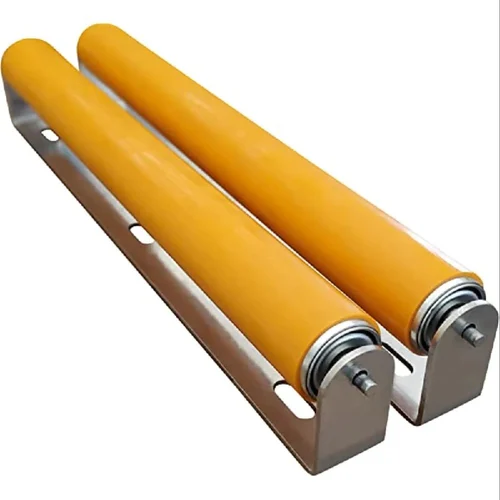In the realm of material handling and industrial processes, conveyor systems form the backbone, seamlessly transferring goods across various points in a production line or warehouse. At the heart of these systems lie two pivotal components: conveyor rollers and idlers. Their quality, efficiency, and reliability significantly impact the overall performance and productivity of conveyor systems.
Understanding Conveyor Rollers and Idlers
Conveyor Rollers: Conveyor rollers are cylindrical components designed to support and facilitate the movement of conveyor belts. These rollers come in various shapes, sizes, and materials, catering to diverse industry needs. The core purpose of rollers is to minimize friction and ensure smooth, continuous motion of the conveyor belt.
Conveyor Idlers: Complementary to rollers, idlers are frames or brackets supporting conveyor belts at regular intervals along their path. They provide necessary support, alignment, and structure to the belt, enhancing its stability and minimizing wear and tear. Idlers are strategically positioned to maintain proper tension and alignment of the conveyor belt.
Importance of High-Quality Rollers and Idlers
The significance of high-quality conveyor rollers and idlers cannot be overstated. These components directly influence the efficiency, reliability, and longevity of conveyor systems, impacting overall operational costs and productivity.
Key Aspects of High-Quality Rollers and Idlers:
- Durability and Longevity: Superior materials and precise manufacturing processes contribute to increased durability, reducing downtime and maintenance costs.
- Reduced Friction: Smooth surfaces, proper sealing, and precision engineering minimize friction, enhancing operational efficiency and belt longevity.
- Alignment and Stability: High-quality idlers ensure proper alignment and stability of the conveyor belt, preventing misalignment issues that can lead to downtime and belt damage.
- Load-Bearing Capacity: Robust construction allows for higher load-bearing capacities, catering to heavy-duty industrial applications.
- Noise and Energy Efficiency: Well-designed rollers and idlers reduce noise levels and energy consumption, promoting a more sustainable and pleasant working environment.
Types and Materials
Types of Conveyor Rollers and Idlers:
- Gravity Rollers: Ideal for lightweight applications where products can be manually pushed or conveyed by gravity.
- Powered Rollers: Utilized in motorized conveyor systems, aiding in automated material movement.
- Tapered Rollers: Designed to facilitate the smooth movement of goods around curves in conveyor systems.
- Impact Rollers: Engineered to absorb impact and reduce damage caused by the dropping of heavy or sharp-edged materials.
Materials Used:
- Steel: Known for its strength and durability, steel rollers and idlers are widely used in heavy-duty applications.
- Plastic: Offering corrosion resistance and reduced noise, plastic rollers find applications in food and pharmaceutical industries.
- Rubber: Utilized as a coating or surface material, rubber rollers provide enhanced grip and shock absorption.
Manufacturing Processes and Quality Assurance
The manufacturing of high-quality conveyor rollers and idlers involves stringent processes to ensure precision, durability, and reliability. Advanced machining techniques, such as CNC (Computer Numerical Control) machining, enable the creation of rollers and idlers with precise dimensions and consistent quality. High-Quality Conveyor Rollers in Melbourne are known for their exceptional performance and reliability in diverse industrial applications.
Quality assurance measures, including material testing, dimensional checks, and load-bearing capacity assessments, are integral in guaranteeing the performance of these components. Adherence to industry standards and continuous improvement in manufacturing techniques further elevate the quality benchmarks.
Applications Across Industries
The versatility of conveyor rollers and idlers makes them indispensable across a spectrum of industries:
- Mining and Aggregates: Handling bulk materials like ores, gravel, and coal efficiently.
- Manufacturing: Assisting in assembly lines, product packaging, and material handling.
- Logistics and Distribution: Streamlining the movement of packages and goods in warehouses and distribution centers.
- Food and Beverage: Ensuring hygienic material handling in food processing and packaging.
Innovations and Future Trends
As technology progresses, innovations in conveyor rollers and idlers continue to emerge:
- Smart Rollers: Integration of sensors for real-time monitoring of temperature, vibration, and wear for predictive maintenance.
- Material Advancements: Development of composite materials offering enhanced durability, reduced weight, and improved performance.
- Energy-Efficient Rollers: Incorporating designs to minimize power consumption and reduce carbon footprints.
Conclusion
In conclusion, the significance of high-quality conveyor rollers and idlers in the realm of material handling cannot be overstated. Their impact on operational efficiency, maintenance costs, and overall productivity makes them indispensable components in modern industrial setups. As advancements continue to drive innovation in material science and manufacturing processes, the evolution of conveyor rollers and idlers is set to shape the future of material handling, paving the way for more efficient, reliable, and sustainable conveyor systems.

